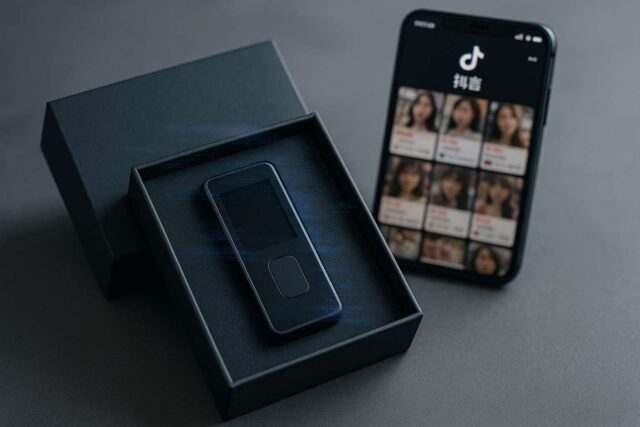A Chinese crypto investor has lost an estimated $6.9 million in digital assets after unknowingly purchasing a tampered cold wallet from a seller on Douyin, the Chinese version of TikTok. Marketed through influencer videos and seemingly legitimate product listings, the device was preloaded with malware, allowing the scammer to drain the wallet as soon as funds were transferred. The Douyin cold wallet scam has sparked concern over the safety of third-party crypto hardware wallets and the growing threat of social media crypto scams targeting retail users.
The Cold Wallet Trap: How the Scam Worked
According to multiple reports, the crypto investor lost $6.9M after purchasing the device through a Douyin-linked e-commerce store. What appeared to be a sealed, trustworthy unit was, in fact, a fake hardware wallet already compromised. Once the investor transferred funds, including Bitcoin (BTC), Ethereum (ETH), and other digital assets, into the wallet, the funds were immediately swept out.
The cold wallet malware was likely embedded during the manufacturing or repackaging process. The pre-configured device stored backdoor seed phrases, enabling remote access upon wallet activation. The investor reportedly noticed the loss almost immediately, but by then, the assets were irretrievable.
Platform Blind Spots and Influencer Responsibility
The incident has prompted questions about Douyin’s role in enabling the scam. The seller operated through a shop promoted by influencers, a common practice on Douyin’s booming social commerce scene. Yet, it remains unclear whether the platform vetted any of the crypto-related products or their sellers.
Experts have warned of an uptick in the sale of counterfeit crypto wallets through social media platforms and marketplace apps. Influencer recommendations, designed to build trust quickly, often bypass the skepticism consumers might otherwise apply. This makes platforms like Douyin fertile ground for TikTok crypto scam operations targeting unwary users.
The Illusion of Security: Self-Custody Isn’t Always Safe
Cold wallets are typically marketed as the safest way to store crypto assets, offline and immune to hacking. But this case reveals that self-custody risks in crypto go beyond online exposure. When the hardware itself is compromised, the very tool meant to protect your assets becomes a weapon.
Security analysts stress the importance of buying cold wallets directly from official manufacturer websites. Used or discounted devices, especially those purchased from resellers on third-party platforms, carry a significantly higher risk of being tampered with.
This Douyin cold wallet scam highlights how even supposedly secure tools can lead to crypto asset theft when sourced through unverified channels.
Gaps in Oversight: The E-Commerce Regulation Void
China’s regulatory framework for crypto remains complex and fragmented. While direct trading and mining are heavily restricted, crypto hardware and blockchain-related products remain in a gray area. This lack of clarity extends to crypto product listings on Douyin, where minimal scrutiny creates openings for scammers.
Legal analysts argue that Douyin may not be legally liable, but ethically, the platform bears responsibility for allowing financial products to be sold with no validation or warning labels. Calls are mounting for stronger safeguards around crypto products sold via social media commerce channels.
How to Protect Yourself from a Fake Hardware Wallet
This incident serves as a cautionary tale for crypto investors navigating the promise of self-custody. To reduce your exposure to fraud:
- Purchase wallets only from verified, official sources.
- Verify product authenticity before activating or transferring funds.
- Never trust pre-set seed phrases included with a device.
- Avoid buying any cold storage device through social media-linked sellers or influencers.
The cost of convenience or a discount can be astronomical in the world of digital finance.
>>> Read more: CertiK May Report: Social Engineering Drives 2025 Crypto Losses
This cold wallet scam on Douyin has emerged as one of the most egregious examples of financial exploitation via social commerce. As crypto adoption spreads and retail users seek tools to manage their own assets, trust in hardware and platforms will become more critical than ever. Without intervention from regulators or accountability from platforms like Douyin, users may remain vulnerable in a landscape where security should be non-negotiable.
Readers’ frequently asked questions
How was the cold wallet compromised if it looked sealed and new?
The tampered cold wallet was likely modified before packaging. It may have included a preset seed phrase or firmware-level backdoor that enabled remote access once funds were added, despite appearing factory-sealed.
Can I still trust hardware wallets for crypto storage?
Yes, but only if purchased directly from verified manufacturers. Cold wallets remain one of the safest storage options, but counterfeit versions sold through third-party or influencer-linked channels carry significant risks.
What are the warning signs of a fake hardware wallet?
Common red flags include pre-included seed phrases, packaging that differs from the official manufacturer’s branding, non-functioning verification codes, or devices sold at steep discounts through unauthorized sellers.
What Is In It For You? Action items you might want to consider
Avoid buying crypto hardware from influencer-linked or third-party marketplaces
If you’re in the market for a cold wallet, skip social media sellers and stick to official brand websites or trusted partners to ensure device integrity.
Verify the authenticity of any cold wallet before first use
Always reset the device, generate a new seed phrase yourself, and confirm that the firmware is up to date and matches the vendor’s latest release.
Monitor platform accountability discussions
Stay informed on how platforms like Douyin address crypto product fraud. Increased scrutiny or regulation could impact future listings and user protections.











[…] >>> Read more: Crypto Investor Loses $6.9M in Douyin Cold Wallet Scam […]